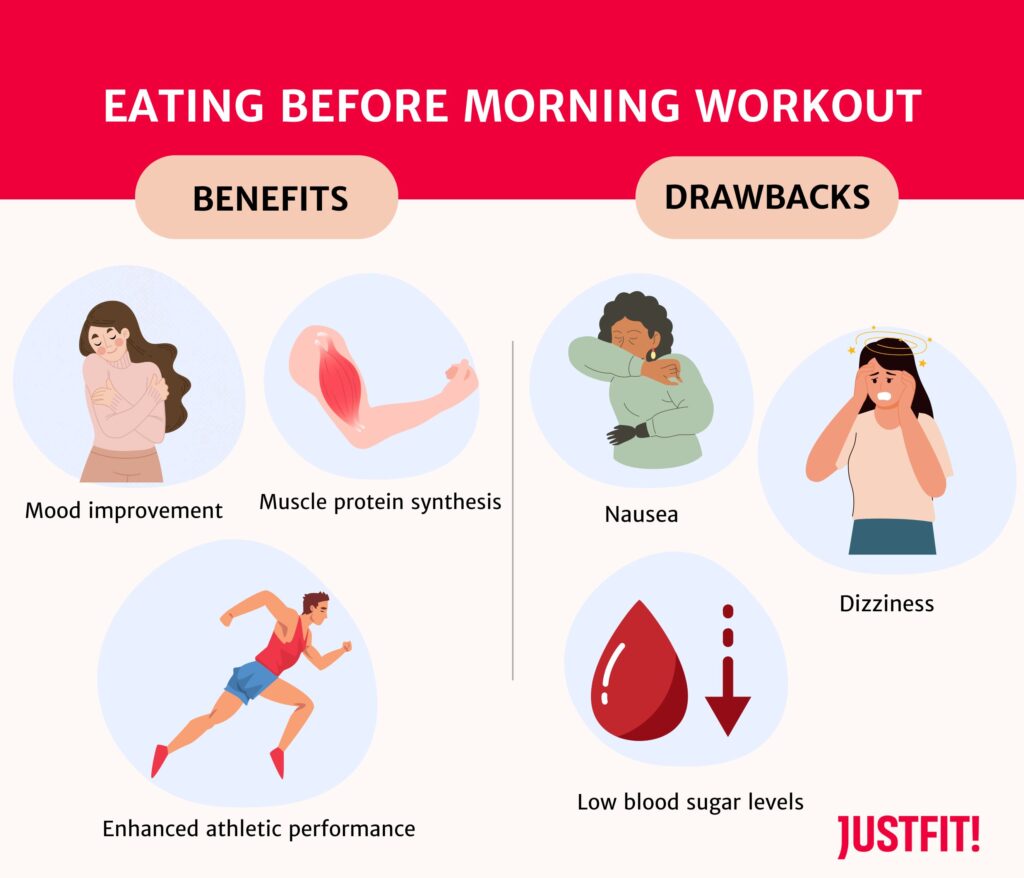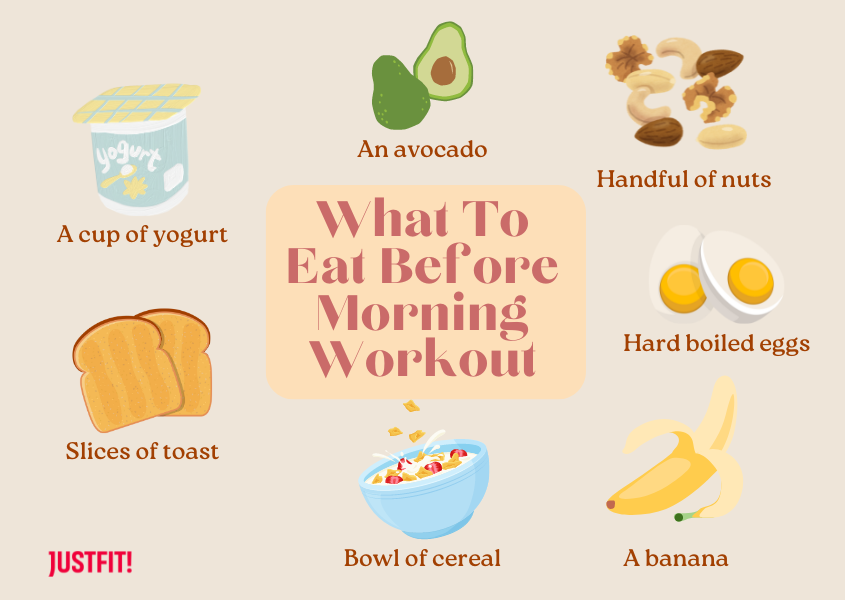




Waking up in the morning to work out is a highly favored activity to awaken the body and mind. According to research, if you choose to work out in the morning, you will not only be alert faster to start the new day but also awaken your body and increase your metabolism. However, people are often unaware of what they can and should eat before their morning exercise, whether it’s a high-intensity workout or low-intensity stretches. Don’t worry, this article will answer all your questions on pre-workout nutrition!
Why You Should Eat Before Morning Workout
The biggest question that needs to be answered is this: Is it essential to eat before your morning workout? The answer is yes, of course it is! Often, people hope to burn away fat faster by getting their workout in right before their morning meals, when the body is low on carbs and will burn away fat for its energy source instead of the glycogen stores. But what many don’t realize is that the body might go for the muscle stores instead of fats, which will impact body definition. Now that we have clarified the reality behind this practice, here are more reasons why you should not skip those morning meals before a workout:
- Exercising on an empty stomach can lead to decreased endurance and low blood sugar levels, which may lead to dizziness, nausea, and fatigue.
- Your body will get used to constantly using the energy from fat reserves and start to store more fat than usual.
- Exercising on an empty stomach, a method often used to reduce fat, is frequently combined with a low-carbohydrate diet. However, combining these two methods can lead to a state called ‘ketosis’, which can be harmful to health due to the increase of ketone bodies in your system.
Now we give you the benefits that proper nutrition before your fitness activities can provide:
- The right meal can support your body’s performance better and promote recovery after each workout. Proper nutrition is crucial for enhancing athletic performance.
- The intake of specific macronutrients and the timing of it helps in decreasing the chances of muscle damage, enhancing tissue repair, and can be responsible for improving mood states after high-intensity exercises. [1]
- Ingesting protein has been verified to increase muscle protein synthesis which is essential for prolonged training. [2]

What To Eat For Pre-Workout Nutrition In The Morning
How many calories to eat before a workout
The amount of recommended calories to be consumed during your pre-workout meals depends on the time you have between your meals and your workout. This is to prevent an upset stomach caused by overeating before exercise and to ensure you have enough energy depending on the different types of activities you do, including high-intensity exercise.
The standard breakfast calorie recommendation is 300-400 calories for a light meal if you have 1-2 hours before your workout. But if you only have the time for a quick snack 30 to 60 minutes before your sweat session, it is recommended to eat about 100-150 calories (eg. a banana). The rest can be eaten within 30-60 minutes after your workout in the morning.
Foods to eat before a morning workout
Here we list a few recommendations for the right foods to choose from:
Low GI carbohydrate: this category of food can increase body fat energy supply by 17.9%
- Sweet potatoes: This powerful source of glycogen, complex fibers, and carbohydrates prevents energy crashes and helps maintain healthy muscle tissue.
- Multi-grain bread with veggies: For a delicious, veggie-filled start to your day, Toast some multi-grain bread and have it with mushroom, spinach, and tomatoes on the side.
- Banana: This convenient snack is a popular go-to food for pre-workout snacks. It has easily digestible carbohydrates, will not have you feeling full, and is efficient to eat on your way to the gym or exercise spot. Moreover, it is extremely high in potassium and antioxidants that will help you stay clear of muscle cramps. We also recommend other easy-to-digest carbs with fruits like avocado, orange, and apple.
- Oatmeal With Fruit: Oatmeal and fruit are a great combination for digesting carbohydrates slowly, which helps in maintaining a stable blood glucose level. This in turn makes it easier to remain energetic and efficient for a longer period of time. Mix it up with some low-fat milk and you’re good to go.
High protein:
- Eggs: We recommend boiled eggs or an omelet, both of which make for a tempting and nutritious morning meal. Eggs are effective in repairing muscles and are a powerful source of amino acids.
- Chicken breast: This lean source of protein makes for a complete meal when paired with carbs for your breakfast
- Yogurt-based smoothie: Who says a healthy diet can’t be a fun one? Skip the store-bought smoothies for a homemade recipe that involves a protein-rich yogurt mixed with nutrient-packed fruit
You may also like: The 10 Best Vegetarian Protein Sources
Fat:
- Salmon: If you love your seafood, choose this fish that’s high in omega-3 fatty acids and ideal for good heart health. Fats take longer than carbohydrates to be digested but are good for providing sustained energy over time.
- Nuts and berries: A bowl full of nuts or a trail mix that includes raisins and almonds is extremely efficient in reducing risks of inflammation after exercise and is high in antioxidants like polyphenols. Decades of research in sports nutrition have shown that including polyphenol-rich foods is crucial for athletes aiming to improve their workout recovery and overall fitness.
Liquid:
- Low-fat milk: Milk is a source of protein and carbs, and helps with some much-needed hydration before a workout while replenishing glycogen stores in the body.
- Lemon honey water: This refreshing drink reduces the risks of cramps and fatigue while supporting immune function through Vitamin C. This is especially great if you’re on a sugar-free diet and craving something sweet in the morning.
- Black coffee: This popular beverage won’t just help wake you up but also induces fat oxidation, which refers to an increase in the rate at which your body burns fat for energy. It can also boost your workout performance by elevating adrenaline levels.
- Sports drinks: For workouts lasting over 60 minutes, sports drinks are recommended as they help maintain electrolyte balance and provide a quick energy boost due to their carbohydrate content.
See also: 7-Day Weight Loss Low-Carb Diet To Achieve Your Dream Body
These are some ideas for a balanced morning meal and what to eat before a workout.

Pre-Workout Supplements
Another question that is often debated within the fitness industry involves the benefits of pre-workout supplements. Does one need them? Can they be harmful in any way? It all depends on your personalized needs and making the right choices with your products on what to eat before a workout.
What do pre-workout supplements consist of?
Pre-workout supplements usually come in the form of powder, gummies, or capsules and are recommended to be taken 20 to 60 minutes before beginning your exercise. They include ingredients like caffeine, amino acids, and creatine, which prevent fatigue and prove to be proper fuel for maintaining energy.
Do pre-workout supplements suit your needs?
The difference between these supplements and protein powder is that while the latter aids in muscle repair, the former enhances the efficiency of your workout. High-intensity interval training (HIIT) can particularly benefit from specific pre-workout supplements. So these can certainly be considered as an addition to a pre-workout complete meal, especially for longer workouts. However, the FDA does not review these supplements for their safety standards, so it is always wise to check with your doctor on what might work best for your needs. According to the American College of Sports Medicine, proper hydration and nutrition are crucial for optimizing athletic performance.
Conclusion
Staying hydrated with enough fluids and boosting yourself with the right food choices, including carbohydrates, fats, and proteins, is the pre-workout goal. We’ve shown the evidence to suggest that these are building blocks to build muscle and enhance your body’s ability for the workout session. With all this delicious food to choose from, we hope that you now have some extra motivation in the morning to wake up and work out!
What should I eat right before a workout?
What is the best pre-workout meal?
What if I eat 30 minutes before a workout?
Is it okay to take pre-workout supplements?
Baker Heart and Diabetes Institute (2024) Carbohydrates and Glycaemic Index (GI) [online]. Available at https://baker.edu.au/-/media/documents/fact-sheets/baker-institute-factsheet-carbohydrates-and-glycaemic-index.pdf
Convertino, V. A., Armstrong, L. E., Coyle, E. F., Mack, G. W., Sawka, M. N., Senay, L. C., Jr, & Sherman, W. M. (1996). American College of Sports Medicine position stand. Exercise and fluid replacement. Medicine and science in sports and exercise, 28(1), i–vii. Available at: https://doi.org/10.1097/00005768-199610000-00045
Kerksick, C. M., Arent, S., Schoenfeld, B. J., Stout, J. R., Campbell, B., Wilborn, C. D., Taylor, L., Kalman, D., Smith-Ryan, A. E., Kreider, R. B., Willoughby, D., Arciero, P. J., VanDusseldorp, T. A., Ormsbee, M. J., Wildman, R., Greenwood, M., Ziegenfuss, T. N., Aragon, A. A., & Antonio, J. (2017). International society of sports nutrition position stand: nutrient timing. Journal of the International Society of Sports Nutrition, 14, 33. Available at: https://doi.org/10.1186/s12970-017-0189-4
Trommelen, J., Betz, M.W. & van Loon, L.J.C. The Muscle Protein Synthetic Response to Meal Ingestion Following Resistance-Type Exercise. Sports Med 49, 185–197 (2019). Available at: https://doi.org/10.1007/s40279-019-01053-5
Youngstedt, S.D., Elliott, J.A. and Kripke, D.F. (2019), Human circadian phase–response curves for exercise. J Physiol, 597: 2253-2268. Available at: https://doi.org/10.1113/JP276943





